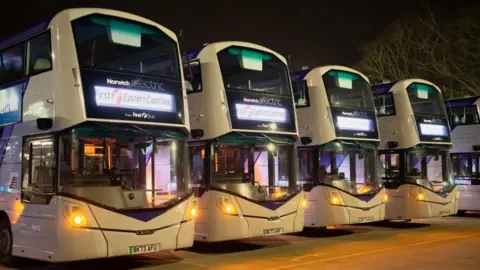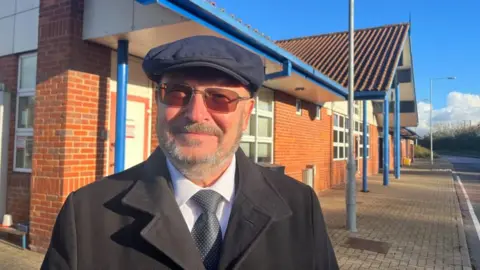Electric buses help boost city's air quality
 First Eastern Counties Buses
First Eastern Counties BusesA fleet of battery-powered buses is being credited with bringing air quality in a city within legal limits.
In 2023, monitoring in Norwich showed a peak of 38.5 micrograms of nitrogen dioxide in a cubic metre of air. The legal limit in the UK and the EU is 20.
Norfolk County Council said figures show the city level fell to 16.5 micrograms per cubic metre during eight of the past 11 months.
Graham Plant, cabinet member for transport and infrastructure, said: "After all the hard work put into bringing these buses to Norfolk, it's great to see the impact the switch to electric can have for our environment."
 Andrew Turner/BBC
Andrew Turner/BBCCouncillor Plant added: " These new electric vehicles produce zero tailpipe emissions, which means a cleaner, greener environment for people to live, work and enjoy.
"With the Roundtree Way depot now operating a fully electric fleet, Norfolk really is a leader in sustainable public transport in the East of England.
"First Bus put their hand in their pocket, they put in several million pounds - more than what the government put in - to make electric work in Norwich.
"That is really important to understand, it's not just the government paying for this; operators are also part of the answer."
 Martin Giles/BBC
Martin Giles/BBCAsher Minns, executive director of the Tyndall Centre for Climate Change Research, based at the University of East Anglia, said the figures were encouraging, but he would prefer to see a longer monitoring period to be certain about the reduction in emissions.
"There is no reason not to think that the electric buses are contributing to the improvement in air quality in those city centre bits where the air quality was really poor and where the buses are frequent.
"Air quality improvement really did start from a pretty low base, definitely linked to diesel buses, not least because these were end-of-life buses that were being sent to Norwich, whereas now we've got state-of-the-art electric buses on quite a lot of the routes."
He said Norwich, although famous for being flat, was prone to a phenomenon called thermal inversion.
"[This] is where air pollution can sit on top of the hill that is Norwich in winter on cold days and on hot days," he added.
"That isn't pollution from Norwich; we accumulate pollution from the continent and the south east, so there is a bit of geography and topography in there which isn't in the control of us.
But certainly for Norwich itself, one of the main contributors that can be influenced is to do with air quality from traffic."
The battery bus fleet was purchased with a £14.7m government grant, which Norfolk County Council applied for, and £23m from FirstBus, which operates the Eastern Counties network.
Piers Marlow, managing director of First Bus East of England, said: "These figures are a clear sign that zero-emission transport can play a significant role in creating cleaner, healthier places for people.
"We're incredibly proud to see the investment in electric buses and depot infrastructure already delivering meaningful benefits for Norwich."
Follow Norfolk news on BBC Sounds, Facebook, Instagram and X.
